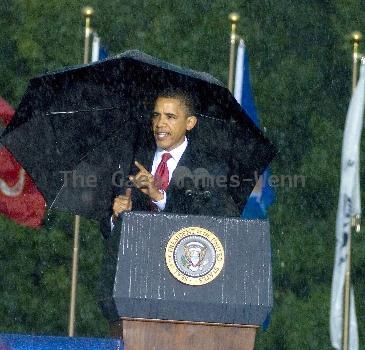Spreading slick stains beaches, tourists even as cap begins collecting oil
By Melissa Nelson, APSaturday, June 5, 2010
Cap collects some oil even as slick taints beaches
PENSACOLA BEACH, Fla. — Beachgoers gawked at tar balls, discolored seashells and orange foam that washed up on the Gulf Coast’s once-pristine white sand shores Saturday, the crude from a busted oil well deep underwater appearing in greater quantities and farther east.
A cap over the gusher was believed to be collecting anywhere from about a quarter to half of the leaking oil, even as the slick stained beaches with a waxy mess that nonetheless appeared to deter few tourists — and attracted the curious.
An aerial tour of the Alabama coast revealed long red tendrils extending into the green water off Gulf Shores, Ala., where oil from beachgoers’ feet spotted boardwalks and some condominiums provided solvents for guests smeared with the brown goo. A reddish streak miles long marked the surf line in front of high-rise condominiums.
“I feel like I’ve gone from owning a piece of paradise to owning a toxic waste dump,” said Erin Tamber, who resettled in the Pensacola area after surviving Hurricane Katrina in New Orleans.
Six weeks after an April 20 oil rig explosion killed 11 workers, oil giant BP PLC has failed to significantly stem the worst spill in U.S. history. The government’s point man for the crisis, Coast Guard Adm. Thad Allen, said at a news briefing Saturday that the cap collected about 252,000 gallons of oil Friday, its first full day of use.
That amount is about a half-percent to 1 percent of the total oil that, according to government estimates, has already leaked from the sea floor.
The device resembles an upside-down funnel and was lowered over the blown-out well a mile beneath the sea to try to capture most of the oil and direct it to a ship on the surface. BP officials are trying to strike a delicate balance by capturing as much oil as possible without creating too much pressure or allowing the build-up of a slushy mixture that can clog pipes and thwarted an earlier containment effort.
Allen compared the process to stopping the flow of water from a garden hose with a finger, saying, “You don’t want to put your finger down too quickly, or let it off too quickly.”
The goal is to gradually raise the amount of the oil being captured, Allen said. The device’s daily capacity is 630,000 gallons, and officials estimate about a half-million to a million gallons a day are gushing out. The well has leaked about 23 million to more than 46 million gallons since the crisis began, according to government estimates.
President Barack Obama pledged Saturday in his weekly radio and Internet address to fight the spill with the people of the Gulf Coast. His words for BP were stern: “We will make sure they pay every single dime owed to the people along the Gulf coast.”
CEO Tony Hayward reiterated Saturday on a company Twitter account that the company would pay all “legitimate” claims. The company estimated this week that it would spend about $84 million through June to compensate for lost wages and profits.
The oil has reached the shores of Louisiana, Mississippi, Alabama and Florida. It has turned marshlands into death zones for wildlife and stained beaches rust and crimson. Some said it brought to mind the plagues and punishments of the Bible.
“In Revelations it says the water will turn to blood,” said P.J. Hahn, director of coastal zone management for Louisiana’s Plaquemines Parish. “That’s what it looks like out here — like the Gulf is bleeding. This is going to choke the life out of everything.”
Longtime friends Rancho Moore, of Warner Robins, Ga., and Kirk Darby of Navarre, Fla., drank beer from plastic cups at the Pensacola Beach fishing pier as they watched Gov. Charlie Crist and musician Jimmy Buffett, a son of the Gulf Coast whose songs famously extol beachgoing pleasures, caucus with tourists.
“A way of life is ending here,” Darby said.
Still, thousands of people were on the beach and hundreds were in the water.
Health officials said that people should stay away from the mess but that swallowing a little oil-tainted water or getting slimed by a tar ball was no reason for alarm — for humans, at least.
More than 500 birds have been found dead from Texas to Florida since the start of the leak, according to a federal tally released Friday, though their exact cause of death was not clear. More than 200 sea turtles have also been found dead.
Allen planned to meet Saturday with Alabama Gov. Bob Riley, who has criticized Coast Guard decisions to send oil-containing boom from Alabama to Louisiana. Oil hit Alabama before the boom could be returned.
“It’s like a battle; you have to move your resources,” Allen said in an interview. “You don’t always get it back in time, but you do your best.”
In Florida, Crist and Sen. George LeMieux said state officials continued to express fears the oil could flow south, bend around the tip of the state and head up the heavily populated East Coast.
But the more immediate concern, Crist said, was that the oil would coat a long swath of the Panhandle, and authorities were pushing for oil skimmers offshore and more cleanup crews on beaches.
Contributing to this report Associated Press writers Greg Bluestein in Grand Isle, La.; Eileen Sullivan in Washington; Paul J. Weber in Houston; Ray Henry in New Orleans; and Jay Reeves in Theodore, Ala.
Tags: Accidents, Alabama, Barack Obama, Coastlines And Beaches, Environmental Concerns, Florida, Louisiana, New Orleans, North America, Pensacola, Pensacola Beach, United States







